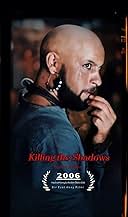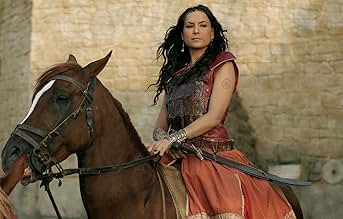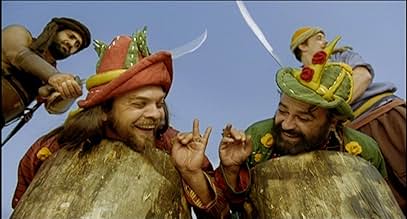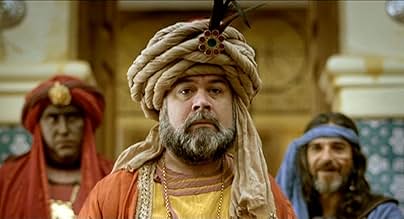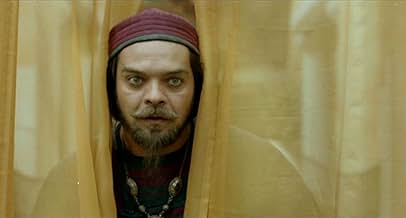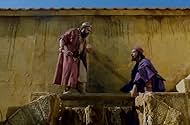Hacivat Karagöz Neden Öldürüldü?
- 2006
- 2h 15min
PUNTUACIÓN EN IMDb
7,5/10
14 mil
TU PUNTUACIÓN
Añade un argumento en tu idiomaA story about the tragedy and the danger of humor and the humorist - A comedy as grand as the Lands of Rome.A story about the tragedy and the danger of humor and the humorist - A comedy as grand as the Lands of Rome.A story about the tragedy and the danger of humor and the humorist - A comedy as grand as the Lands of Rome.
- Premios
- 9 premios y 7 nominaciones en total
Aysen Gruda
- Ana
- (as Ayşen Guruda)
Reseñas destacadas
"Karagoz Hacivat Neden Olduruldu" is Akay and Kazak's take of the legendary personalities Karagoz and Hacivat who are the main characters of Turkish shadow theater. Although their life stories are not known, Akay and Kazak tell a very plausible story that could easily be true. True or not, their story fits exactly what they symbolize - the synthesis of crude and sophisticated humor freely targeting dishonesty, corruption, unfairness and inequality in society.
The setting is the early 14th century, when Byzantian and Seljuk Empires were in shambles following the destructive Mongolian invasion. At the Muslim/Christian borderlands, and out of the reach of the now weakening Mongolian power, the Ottoman State is at its infancy, rapidly expanding at the expense of the neighboring Byzantian and Turkish principalities. Since the cultural homogenization is not as fast as military conquests, a colorful, eclectic intermixing of cultures is underway. This is the perfect breeding ground for the elements Akay seems to take his inspirations from, and he weaves them into his story so masterfully.
Ezel Akay seems to reach his maturity at a very early stage. With his second movie, he already has a signature style and an efficient formula to make the audience laugh and cry with only a snap of a finger. He has absolute emotional control over the audience, thanks to his masterful use of visuals and music.
He also owes a lot to Haluk Bilginer (Karagoz), who is an acting genius. (His talents seem to include Mongolian throat singing if my ears did not deceive me). Beyazit Öztürk (Hacivat) is not as talented an actor, but he is the wisest choice for the role. Another good casting is Güven Kirac as the villain. He has such a wide acting range, he gave me the impression that he could have played almost all the roles in the movie.
Like Akay's earlier movie 'Neredesin Firuze', the music is outstanding - Central Asian Turko-Mongolian tunes yet to be "contaminated" by Middle Eastern influences, beginning to clash with already eclectic Eastern Roman-Judaic melodies. The dynamic synthetic nature of the music parallels with the cultural synthesis what early Ottoman state and society building is all about.
The setting is the early 14th century, when Byzantian and Seljuk Empires were in shambles following the destructive Mongolian invasion. At the Muslim/Christian borderlands, and out of the reach of the now weakening Mongolian power, the Ottoman State is at its infancy, rapidly expanding at the expense of the neighboring Byzantian and Turkish principalities. Since the cultural homogenization is not as fast as military conquests, a colorful, eclectic intermixing of cultures is underway. This is the perfect breeding ground for the elements Akay seems to take his inspirations from, and he weaves them into his story so masterfully.
Ezel Akay seems to reach his maturity at a very early stage. With his second movie, he already has a signature style and an efficient formula to make the audience laugh and cry with only a snap of a finger. He has absolute emotional control over the audience, thanks to his masterful use of visuals and music.
He also owes a lot to Haluk Bilginer (Karagoz), who is an acting genius. (His talents seem to include Mongolian throat singing if my ears did not deceive me). Beyazit Öztürk (Hacivat) is not as talented an actor, but he is the wisest choice for the role. Another good casting is Güven Kirac as the villain. He has such a wide acting range, he gave me the impression that he could have played almost all the roles in the movie.
Like Akay's earlier movie 'Neredesin Firuze', the music is outstanding - Central Asian Turko-Mongolian tunes yet to be "contaminated" by Middle Eastern influences, beginning to clash with already eclectic Eastern Roman-Judaic melodies. The dynamic synthetic nature of the music parallels with the cultural synthesis what early Ottoman state and society building is all about.
Thats really magnificent movie, still i am listening movies soundtrack whenever i miss my history. I usually watch movie just once if its beautiful 2-3 th times but hacivat karagoz totally out of my league 8 or 9 times I already watched. İn the beginning I watched with my all guest you know as a Turkish people we like to go to family friends and my every guest watched this movie. Details effect me to much with a lovely soundtracks and they are really well prepared after the 3 th times you are focusing the details and every details was perfect. Movie's smells like historical taste like instructive and totally comic movie just watch...
It is not surprising to read bad reviews from international press since it's telling the not-well-known background story of a folkloric "shadow game" that we all know from childhood. Giving a difference perspective on the actual characters of hacivat and karagoz, it made me think of those times and what really might have happened to them. ALso a great look to the periods diversity and how Turks become Muslims one by one. This movie is one of the best Turkish movies I've ever watched lately, it's not referring to any cheesy jokes in reference to today's audience; it's not using it's actors' and actress' well known fame and it gives you the idea that Ezel Akay had just to shot a strong period movie with excellent costumes and art directing. Spoken language in the movie is something to be considered- it sounds foreign in the beginning but then you come to recognise the words and the old sayings that were used back then; a joint of middle-Asian Turkish, arabic, roman and hebrew. The scenes were delicately worked out, reminding of the famous ottoman art pieces.One thing that I didn't like much is the not-so-convincing visual effects, but well, don't see good cgi around here, so can't blame anyone.
I watched this movie during the Copenhagen film festival, and thought I was going to see an ethnically different movie with poor actor, poor instruction and poor special effects, if any. I have never been more wrong regarding expectations when entering a movie theater.
I watched a fascinating story with good acting performances, that had a fascinating and important story to tell, which was as valid in the 13th century as it is today. Besides picturing philosophical topics, it has and "underplayed" humor regarding how humans use religion. By far the best movie I have seen this year. The only downside to the movie is that it is too long - on the other hand, this provides time to think about the plot and the points the movie is making.
I watched a fascinating story with good acting performances, that had a fascinating and important story to tell, which was as valid in the 13th century as it is today. Besides picturing philosophical topics, it has and "underplayed" humor regarding how humans use religion. By far the best movie I have seen this year. The only downside to the movie is that it is too long - on the other hand, this provides time to think about the plot and the points the movie is making.
10esitgen
I would like to thank and congratulate Ezel Akay who is also directed another good comedy "Neredesin Firuze" for this marvelous film with a very good story, extraordinary performances of Haluk Bilginer, Sebnem Donmez, Beyazit Ozturk, Aysen Gruda and others and with a wonderful soundtrack.
I agree that the story of the film is based on rumors and folk stories, but it must also be said that the historical background is realistic. It helps understanding the historical and cultural environment of Anatolia in 13th and 14th century. Disintegration of Seljuk rule, Mongol invasion, rise of Ottomans, islamization of both Anatolia and Turkmen tribes, role of women in an early Islamic society, life and beliefs of Turkmen tribes, collapsing Bisance and more are the historical background of the film which successfully enlivens these serious subjects with a humorous story. It must also be added that the soundtrack of the film is based on the historical Turkish music with a contemporary performance.
I strongly recommend this film not only to everyone who is interested in these issues but also to everyone who wants to have a good time and enjoy.
I agree that the story of the film is based on rumors and folk stories, but it must also be said that the historical background is realistic. It helps understanding the historical and cultural environment of Anatolia in 13th and 14th century. Disintegration of Seljuk rule, Mongol invasion, rise of Ottomans, islamization of both Anatolia and Turkmen tribes, role of women in an early Islamic society, life and beliefs of Turkmen tribes, collapsing Bisance and more are the historical background of the film which successfully enlivens these serious subjects with a humorous story. It must also be added that the soundtrack of the film is based on the historical Turkish music with a contemporary performance.
I strongly recommend this film not only to everyone who is interested in these issues but also to everyone who wants to have a good time and enjoy.
¿Sabías que...?
- CuriosidadesKirakosyan used the fire as key light at night scenes.
- Banda sonoraDört Kitabin Manasi
(The Meaning of Four Books)
Performed by Haluk Bilginer & Sebnem Dönmez
Music composed by Ender Akay
Selecciones populares
Inicia sesión para calificar y añadir a tu lista para recibir recomendaciones personalizadas
- How long is Killing the Shadows?Con tecnología de Alexa
Detalles
- Fecha de lanzamiento
- País de origen
- Sitio oficial
- Idioma
- Títulos en diferentes países
- Killing the Shadows
- Localizaciones del rodaje
- Empresa productora
- Ver más compañías en los créditos en IMDbPro
Taquilla
- Presupuesto
- 3.500.000 US$ (estimación)
- Recaudación en todo el mundo
- 3.004.541 US$
- Duración2 horas 15 minutos
- Color
- Mezcla de sonido
- Relación de aspecto
- 1.85 : 1
Contribuir a esta página
Sugerir un cambio o añadir el contenido que falta

Principal laguna de datos
By what name was Hacivat Karagöz Neden Öldürüldü? (2006) officially released in Canada in English?
Responde
